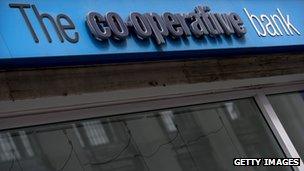What did regulators know about Co-op Bank?
- Published
- comments

Co-op Group has to find £1.5bn to fund the bank
Creditors and customers of Co-op Bank are part of a bold experiment, which - if it works - could set a useful precedent for how banks can be rescued without placing a burden on taxpayers.
And if it doesn't work? Well, it could all get quite messy.
The background, as if you didn't know, is that the regulator, the Prudential Regulation Authority, determined that Co-op Bank has a £1.5bn shortage of capital - the financial buffer that all banks must have to protect savers and depositors from losses.
There were two causes of that hole.
Most importantly, the previous management of the bank failed, in an almost catastrophic way, to keep tabs on losses being generated by bad loans - most of which were commercial property loans made by Britannia Building Society, and which Co-op inherited when it bought Britannia in 2009.
The second cause of Co-op Bank's weakness is that the regulator has imposed more demanding requirements on all banks for the amount of capital they have to hold.
As I've mentioned before, Co-op Bank is a PLC - a bank with a conventional public company structure - that is owned by a mutual, the sprawling Co-op Group.
Now both Co-op Bank and Co-op Group have new management, led by Co-op Group's chief executive, Euan Sutherland.
They can't be held responsible for the disaster at Co-op Bank - and in fact they are on the point of setting up an independent commission whose job will be to evaluate how it all went so badly wrong, and why it took so long for the bank's capital hole to be spotted.
As I have said a few times before, the previous executives of Co-op Group and Co-op Bank, and the erstwhile regulator, Financial Services Authority, have a lot of explaining to do.
Altogether odd
The current top regulator of banks, Andrew Bailey, chief executive of the Prudential Regulation Authority, has told MPs that at the end of 2011 the FSA instructed the Co-op Bank to strengthen its capital.
But that is not remotely the same as saying the FSA knew that the Co-op Group had roughly half as much capital as it needs - which is what we now know.
If the FSA didn't know about that yawning capital gap, why didn't it know?
And if it did know, why didn't it take evasive action at that very moment - which would have been its duty - to replace management and fill the capital hole?
The failure of the regulator to act till only a few weeks ago is altogether odd.
What about current Co-op executives? Well, to state the obvious, they have to determine how to rescue Co-op Bank.

The Co-op Group chief executive hopes to complete bank rescue by November
What they have had to balance are the interests of Co-op Bank's creditors - its depositors and holders of assorted bonds and preference shares - and the interests of the Co-op Group's many millions of members.
Now it is clear to Mr Sutherland and his team that Co-op Group could not afford to find the full £1.5bn that Co-op Bank was told by the PRA that it needs to raise within just a few short months.
Or, to be more precise, it might have been able to find all that, but at too great a price - they calculated - for Co-op Group's millions of members.
For example, a fire-sale disposal of Co-op's funeral homes or pharmacies would have been at a discount price that would have hobbled the group to a serious and possibly irreparable extent.
So, on the basis of legal advice, they concluded that their duty to Co-op Group's members precluded them from taking on the full cost of rescuing the bank.
Serious thought
As I mentioned on Tuesday, this may seem a bit counter-intuitive, since the owner or owners of a bank (or any other organisation) would normally be presumed to be the rescuers of that bank, until all their resources are exhausted.
But apparently Co-op Group's duty of care to its members meant it could not conduct the rescue alone.
So what were the alternatives?
Well, the Co-op Group gave serious thought to admitting that Co-op Bank had failed, and putting it into a process called "resolution" - where the Bank of England would have temporarily taken over the ownership and stewardship of the bank, to keep it functioning and come up with a scheme to protect depositors.
The best way of understanding "resolution" is as a version for banks of the "administration" process that companies go into when they can't repay creditors: it was designed after the great crash of 2008 to take account of the importance that banks play in the economy and the imperative of minimising losses (if any) for depositors.
Co-op Group's board decided that it would wish to avoid putting Co-op Bank into resolution, if it possibly could, so as to avoid increased damage to the "Co-op" brand.
Lustre would not have been added to the reputation of the co-operative movement for it to be blamed for the first big bank failure since the 2008 financial crisis.
So Co-op Group came up with a compromise, under which it would put £1bn of new capital into Co-op Bank, and £500m would come from writing off and converting into equity capital some of what is owed by Co-op Bank to holders of subordinated debt and preference shares (see my blog of Tuesday for more on this).
The various forms of subordinated debt are loans to Co-op Bank that are in theory higher risk than other loans to Co-op Bank, and they pay a higher rate of interest to compensate for this risk.
Protect depositors
Preference shares are shares that pay a fixed rather than variable dividend, and - unlike ordinary shares - they normally don't have voting rights.
Holders of the subordinated debt are largely investment institutions, but they also include thousands of retail investors.
Co-op Group's management regarded heaping losses on the holders of subordinated debt and preference shares as fair, given that, if Co-op Bank were to go into resolution, these investors would almost certainly incur much bigger losses: under the resolution rules, these creditors would have the bank's losses foisted on them, to protect depositors, and no cushion of new equity capital provided by Co-op Group.
The Prudential Regulation Authority approved this rescue plan. In fact, the regulators relished it - because foisting losses on holders of subordinated debt, what is called a "bail in" as opposed to a "bail out" in the hideous jargon, is the stuff that makes the regulatory community drool with excitement.
The point is that if losses can be foisted on providers of subordinated debt, then banks that get into difficulties can be rescued without taxpayers having to inject money, or at least much less money than in 2008.
So that is the bold and exciting experiment being conducted at Co-op Bank, the regulators' wet dream of a bank rescue in which private-sector investors do all the heavy lifting.
But, as is apparent in the case of the Co-op, there are snags with the bail-in, under current conventions: the bail-in (or what Co-op Group calls a "Liability Management Exercise") will take weeks and months to execute - and, actually, could be rejected by the providers of the subordinated debt.
Difficult negotiation
You presumably don't need telling why rejection by bondholders would be problematic: it would see the Co-op Bank collapse into resolution (or so Co-op Group insists), which (as I have said) would probably see much bigger losses piled on the subordinated debt holders and preference share holders, and create uncertainty for depositors with more than the insured limit of £85,000 in the bank.
So whether they like it or not, and subject to a difficult negotiation over what percentage of Co-op Bank's new shares they get for writing off their loans to the bank, the subordinated debt holders may ultimately agree to the rescue.
However for every week that passes before the rescue is actually completed, depositors with the Co-op have the time and perhaps a nagging desire to take their money out.
That raises the risk that the Co-op would become dependent on emergency funding that would be provided by the Bank of England.
And the Bank of England can only sustain that support without seizing control of Co-op Bank - placing it in resolution - for as long as it remains confident that the hole in the Co-op Bank's capital will be filled, or that Co-op Bank is solvent.
We saw, during the banking crisis of 2007-8, how ruthless the Bank of England can be when it loses confidence in the solvency of a bank.
Or to put it another way, the longer it takes for a private-sector rescue of Co-op Bank to take place, the greater the risk of the patience of regulators being exhausted.
All of which is a meandering way of saying that the bail-in looks like a great idea, but it can be stressful, traumatic and even disastrous if its execution drags on.
The plan in this case is to complete the bail-in, the liability management exercise, by early to mid November.
Given the loyalty of Co-op Bank's customers, that may well be soon enough.
But some might say it is a bit strange and arguably unsatisfactory that the Prudential Regulation Authority has been unable to find a faster timetable for its cherished bail-in.
Update 1800
It may sound like bad news that Co-op Bank has been told by its regulator, the Prudential Regulation Authority, that it must not pay the interest on £110m of debts called perpetual subordinated bonds.
But actually the managers of the bank, and of the bank's owner, Co-op Group, would view it as good news.
Because it reinforces the message to the holders of these bonds, and £1.2bn of other bonds, that the group is in dire straights - and it is in their interest to agree to a rescue deal that would force big losses on them.
What I have learned is that Co-op Group has considered putting its bank into the financial equivalent of administration, called resolution, which is where the bank would in effect be taken over by the Bank of England, to keep it functioning and protect depositors - while forcing potentially much bigger losses on bondholders.
It is to avoid resolution that the Co-op Group has asked bondholders to sign up to what's known as a bail-in, which would see them writing off some of what they are owed and converting some of their debts into shares.
Some bondholders are complaining this isn't fair, and that Co-op Group should bear more of the pain. But Co-op Group says it is doing all it can afford.
As to quite how it got into this mess, the new executives of Co-op have asked Sir Christopher Kelly, the former chair of the committee of standards in public life, to investigate the behaviour of the previous executives.